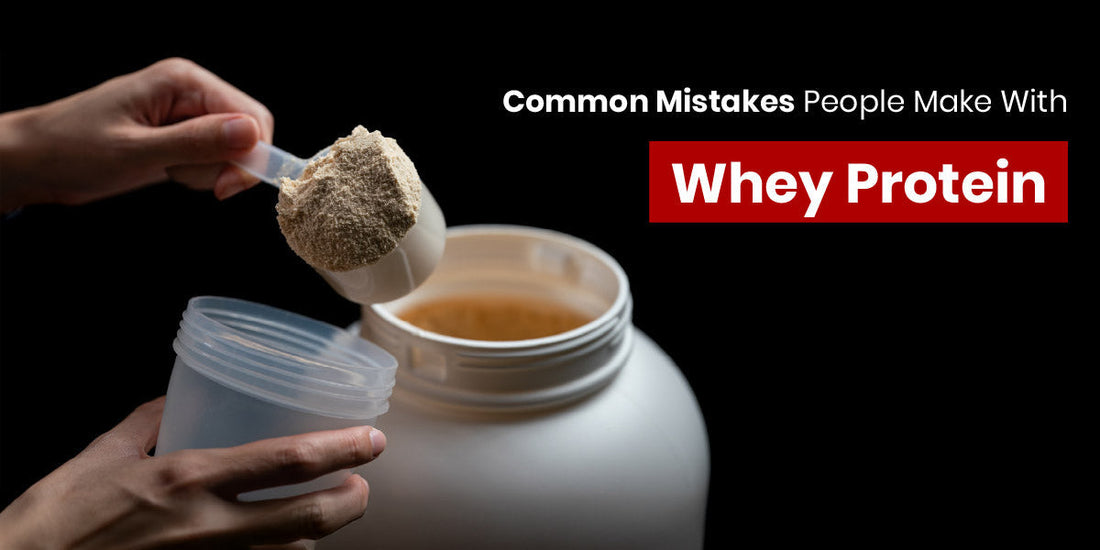
Common Mistakes People Make with Whey Protein
byWhey protein is one of the most popular supplements among fitness enthusiasts, athletes, and even casual gym-goers. Rich in vital amino acids, it digests quickly and is an excellent tool for promoting muscle growth and recuperation.
But here’s the truth: just taking whey protein isn’t enough. Many people unknowingly make mistakes that can limit their results or even cause unwanted side effects.
In this blog, we’ll break down the most common mistakes people make with whey protein and how to fix them — so you can unlock its full potential.
1. Over-reliance on Whey Protein at the expense of Whole Foods
The Mistake:
Relying on whey protein for the majority of your protein intake or using it to substitute meals.
Why It’s Wrong:
Whey Protein is a dietary supplements, not a substitute for a balanced diet. Over-reliance can lead to nutritional gaps since whole foods provide fiber, vitamins, minerals, and healthy fats that whey lacks.
The Fix:
Aim for 80% of your protein from whole foods like lentils, tofu, dairy, eggs, and meat (if non-vegetarian). Use whey protein to supplement when needed — like post-workout or during busy schedules.
2. Taking Whey Protein at the Wrong Time
The Mistake:
Taking whey protein at random times, often far from workouts.
Why It’s Wrong:
Whey is a protein that digests quickly, making it perfect for after a workout when your muscles are ready to take in nutrients.
The Fix:
Consume 1 scoop (20–30g) of whey protein within 30–60 minutes after your workout to maximize muscle recovery and protein synthesis.
3. Ignoring the Ingredient Label
The Mistake:
Choosing any whey protein product without reading the ingredients or nutrition label.
Why It’s Wrong:
Some whey powders are loaded with added sugars, fillers, artificial colors, or low-quality protein blends that affect digestion and absorption.
The Fix:
Look for whey protein with:
- 24–25g protein per scoop
- Minimal added sugar (ideally <2g)
- No harmful additives
- Third-party lab-tested for purity
Choose Whey Isolate if you’re lactose-intolerant or aiming for low-carb/high-protein.
4. Not Pairing Whey with the Right Nutrients
The Mistake:
Only taking protein and neglecting carbs or healthy fats post-workout.
Why It’s Wrong:
Carbohydrates help replenish glycogen, while a small amount of fat can help with absorption. Ignoring this may delay recovery.
The Fix:
Pair whey protein with a banana, oats, or nut butter post-workout to balance macros and fuel muscle repair.
5. Skipping It on Rest Days
The Mistake:
Not consuming whey on non-training days.
Why It’s Wrong:
Muscle recovery and growth continue even when you’re not working out. Your body still needs protein to rebuild and maintain muscle tissue.
The Fix:
Include a scoop of whey protein on rest days — either with breakfast or as a midday snack — to maintain muscle protein synthesis.
6. Overconsumption – More Isn’t Always Better
The Mistake:
Taking 3–4 scoops daily, thinking it will speed up results.
Why It’s Wrong:
Your body can only use so much protein at a time. Excess may convert to fat or burden your kidneys over time, especially if water intake is low.
The Fix:
Stick to 1–2 scoops (20–50g) per day, depending on your total protein goal. Use it to fill gaps, not as your main source.
7. Not Drinking Enough Water
The Mistake:
Consuming high amounts of protein without increasing water intake.
Why It’s Wrong:
Protein metabolism requires water. Low hydration can cause digestive issues, bloating, or kidney stress.
The Fix:
Drink at least 3–4 liters of water per day, especially if your protein intake is high. This supports better digestion, kidney function, and nutrient transport.
Final Thoughts
Whey protein can absolutely support your fitness goals — whether you’re looking to build muscle, lose fat, or recover faster. But it’s only as effective as the way you use it. By avoiding these common mistakes, you’ll get more out of every scoop and keep your body performing at its best.
FAQs About Whey Protein Mistakes
Q1. Can I take whey protein before bed?
Yes, but casein protein is better suited for slow digestion overnight. If using whey, pair it with nut butter or oats.
Q2. Is whey protein bad for kidneys?
Not for healthy individuals. Drink enough water and stick to recommended doses.
Q3. What’s the difference between whey concentrate and isolate?
Isolate has more protein, less lactose and fat. Ideal for lactose-sensitive people or those on a calorie-restricted diet.









